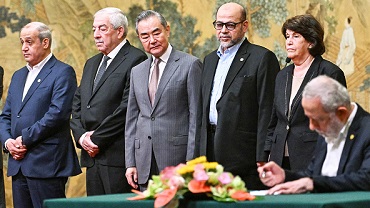The Australian Alert Service is the weekly publication of the Australian Citizens Party.
It will keep you updated on strategic events both in Australia, and worldwide, as well as the organising activities of the Citizens Party.
To subscribe to the Australian Alert Service, it's easy, and it's secure.
Lead Editorial
24 July 2024
Vol. 26 No. 30
Three major shocks in the USA spell dramatic upheaval for the period ahead. Overthrowing the rotten status quo necessitates upheaval, but the events of recent weeks, unlike anything since the tumultuous 1960s, can also lead to internal conflict and civil unrest.
In just over three weeks, we have witnessed: the incredible Trump-Biden debate in which it became clear that the US President was not governing America, raising the obvious question about who is; the assassination attempt against Trump with the explicit failure, and thereby potential implication, of the Secret Service; and the decision of Biden to stand aside as the Democratic Party’s presidential nominee, which leads to the question of who should determine his replacement—the party machine or elected delegates (back page)? These are all momentous and unprecedented eruptions on the US political scene, occurring at a time of immense danger on the world stage.
We are a world at war, with major powers in confrontation on an expanding field of conflict, including: A seemingly assured escalation of the Israel-Gaza war beyond current borders; and potential new fronts foreshadowed by NATO at its 9-11 July summit (p. 12; “NATO summit aims at big war in Europe, expansion vs China”, AAS, 17 July), involving escalation of the offensive against Russia with US long range missiles to be stationed in Germany, and the buildup towards confrontation with China in the Pacific region.
Desperate leaders and factions which are losing their grip—from Israeli Prime Minister Netanyahu to the morally decrepit US Democratic Party—are creating the circumstances for a spiralling disaster. Nor do the sanctioned political alternatives—be it the new Labour government in the UK under Keir Starmer (p. 10), or Trump in the USA—offer much promise of anything better.
But there is a contrary spirit, which presents itself in leaders of diverse nations and political factions around the globe.
On that front, China has just announced that it successfully facilitated an agreement between Palestinian rivals Hamas and Fatah, to recognise the Palestine Liberation Organisation (PLO) as the representative body for all Palestinians, after hosting 14 divided factions.
China’s approach to diplomacy, which hinges on finding common ground between parties to broach even the deepest enmities, is based on its intention to take greater leadership on the global stage, in matters of both economics and security. The global Anglo-American hegemon views this as a threat, but as the descent into war continues more will realise it is the only pathway to survival.
In a speech delivered 18 July at the Aspen Security Forum in Colorado, Gen. Laura Richardson, commander of the US Southern Command, bagged China’s Belt and Road Initiative as “state-owned enterprises by a communist government” building “dual-use” critical infrastructure—deepwater ports, 5G, cybersecurity, space, etc.—which could be flipped to “a military application” under crisis conditions.
Yet we have just seen another example of why the majority of countries prefer the newcomer to the hegemon: the extensive IT disruption caused by the cyber company, CrowdStrike, that led the “Russiagate” sabotage of Trump’s attempted rapprochement with Russia after the 2016 US election. Russia and China, isolated on the IT and cybersecurity front due to sanctions, largely escaped the disruption.
China’s diplomacy has already been successful, achieving reconciliation between Saudi Arabia and Iran, and is now providing a basis for potential Ukraine-Russia peace talks. That latter potential has been seized upon by Hungarian Prime Minister Viktor Orbán, who has taken the same approach in his discussions with leaders in Kiev, Moscow, Beijing, the USA and the European Union.
Not coincidentally, this is the same method the Australian Citizens Party applies to its political campaigns, successfully uniting thinkers from all political persuasions around common concerns. Historically, as seen with the 1648 Peace of Westphalia which ended the gruelling Thirty Years’ War in Europe, this is the only approach by which civilisation will survive.
In this issue:
- Digital disruption proves cash is king (and Australia needs a public postal bank)
- Aussie ‘Top Gun’ Dan Duggan submits final appeal for Australian justice next week
- ALP-led inquiry blocks bank victims from enlarging focus onto the biggest financial abusers—banks
- Chalmers flaunts hypocrisy at Pacific Banking Forum
- Sunny Duong jailed for having political connections while Chinese
- Surviving the Post Office
- Starmer government won’t break cycle of austerity
- NZ: Ex-leaders speak out after Luxon talks of making military ‘force multiplier’ for US
- The attempted assassination of Trump
- Don’t underestimate the power of a determined community!
- Time to end the corrupt party system
- ALMANAC: Return banking ‘to the greatest advantage of the people of Australia’
Click here to find out how to subscribe. For freely available AAS articles, click here.
Click here for the archive of previous issues of the Australian Alert Service








